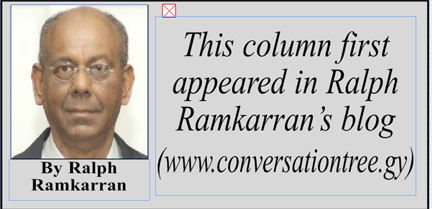The campaign against the parking meters was sustained by the outrage of citizens at the exorbitant charges imposed. These charges are simply not affordable by most of the people who are employed in Georgetown and travel to work in their motor cars. The same case that has been made by teachers at Bishops High and staffers at the Bank of Guyana, who were given free parking by Smart City Solutions (SCS), applies to most others.
A substantial section of the weekly demonstrators, sponsored by Movement Against Parking Metres (MAPM), have been members of the business community. Reports suggest that business activity has suffered a substantial decline in the city since the imposition of the parking meters. Businesspeople and vendors in the metered areas have complained bitterly that the number of customers have dropped precipitously. They suggest that the effect on businesses would be wide-ranging and devastating to profits, employees and economic growth. I believe that this, coupled with the demonstrations, have motivated the government to step in for the second time.
It is clear that either a feasibility study was not done or not competently done. The SCS includes a Mexican firm, which is a specialist parking meter operator in big cities. It has sophisticated and expensive equipment. To profitably deploy an operation in a small city like Georgetown, with limited vehicle numbers, requires charges that are simply not payable. This is what a properly done feasibility study would have shown. It would be interesting to see the information that motivated the Mexicans to invest.
Most of the people who are now parking in the metered areas are not paying and while the walking distance to work inside the metered area, from outside the metered area, remains at 15 minutes or so, most of those who are at work all day will park their cars outside the metered area. Motor car owners will not get used to the idea of eventually paying. They simply cannot pay. The availability of free parking space 15 minutes out of the metered area was clearly not fed into the calculations of investors in SCS.
The city council has made a case for parking meters. Most people, including MAPM, now support parking meters. They have concluded that the city council needs more funds, and efforts need to be made to control traffic in the city. They believe that parking meters can accomplish both objectives. But the process of arriving at an agreement and ensuring that its terms are acceptable have been deeply flawed.
It must be noted that the government stood by and allowed the parking meter contract between the city council and SCS to be implemented, despite the growing opposition to it and the secretive and undemocratic manner in which it was approved. The government had the power to influence the city council but declined to do so. It was not until the furore became widespread that it requested that the contract be examined by the Attorney General and the Minister of Finance. Both had serious reservations but the city council nevertheless persisted, after minor, placatory, amendments disarmed the government.
The fall-out from the parking meter affair has now become palpable and is taking its toll. MAPM has mobilized such a wide and growing cross-section of people that the government now realizes that it will not go away. It is draining away goodwill from the government. That is why the government proposed that the city council suspend its agreement with SCS for 90 days and renegotiate its terms.
In response to the government’s request, the city council pleaded the ‘terror’ clauses in the contract with SCS as the reason why it cannot suspend the contract. The city council argued that the agreement does not provide for suspension and that if it does what the government asks, it will be sanctioned by the ‘terror’ clauses, which provide substantial penalties. Faced with city council recalcitrance, the government acted. It suspended the parking by laws thereby prohibiting the operationalization of the contract.
It should not be lost on anyone that the government is merely advising a ‘renegotiation.’ This contract cannot be ‘renegotiated.’ The highest parking fee that is affordable to Guyanese would be too low to secure a profitable operation for SCS and the city council. Citizens will now expect that MAPM will continue its mobilization and protest activity to bring an end to the contract.
